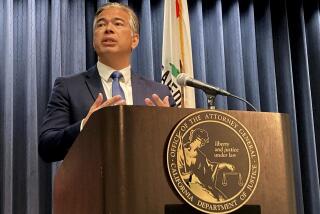India Seizes 3 Key Suspects in Bombings
- Share via
NEW DELHI — Indian authorities have jailed more than 1,000 people, including three men described as key suspects, as part of a two-day nationwide sweep after Sikh terrorist bombings killed more than 75 people Friday and Saturday.
Ved Marwah, the police commissioner of Delhi Union Territory, described the arrest of the three men Sunday in a central area of the capital as “vital progress” toward solving the obviously well-organized bombing campaign, in which gunpowder charges in lead casings were concealed in transistor radios and placed on public buses and trains.
However, Marwah would not elaborate on the case, except to say that four police officers were injured by the suspects while making the arrests.
“The whole conspiracy had very wide ramifications and we want to ensure that every culprit is apprehended,” he said. “I have firm orders not to divulge anything else.”
Attorney Reported Arrested
However, the Indian Express newspaper in today’s editions reported that one of the three key suspects arrested is a prominent Delhi attorney, Kartar Singh Narang, 54. The newspaper quoted sources as saying that officers followed two suspected terrorists to the attorney’s home, where they found several weapons.
In all, more than 30 terrorist bombs were exploded in the federal territory of New Delhi, where 45 died, and in surrounding states.
Prime Minister Rajiv Gandhi’s Cabinet met in emergency session Sunday to review the crisis.
The army continued to patrol key areas of the capital as well as Chandigarh, the combined capital of Punjab and Haryana states, and all of the Punjab in northwest India.
New Delhi, with its population of 5 million, was calm but tense Sunday. Markets were less crowded than usual and movie theaters, normally fully booked in advance for Sunday showings, had many empty seats.
Police and constables inspected handbags and packages of city bus passengers and theatergoers. Many of the bombs planted by the so-called “transistor terrorists” were placed on crowded public buses and trains Friday night before the second Saturday of the month, a government holiday in India.
No ‘Hindu Backlash’
Officials said the most important fact since the bombing campaign ceased Saturday morning was that the much-feared “Hindu backlash” had not materialized.
Most here believe the bombings were carried out either by Sikh separatists, who want an independent homeland called “Khalistan” in Punjab state, where Sikhs are a majority, or by Sikhs who want greater autonomy for the Punjab. By provoking the majority Hindu areas of India to attack Sikhs, the terrorists would hope to polarize the two communities, which for most of their history have been closely tied by intermarriage and shared beliefs, with many Hindus worshiping in Sikh temples.
Leaders of the Hindu nationalist Bhartiya Janata Party have called for a strike in New Delhi today to protest government handling of the bombing campaign. The party contends that the government was warned of the attacks and failed to react sufficiently.
However, a rally called by the party scheduled for Sunday was ordered canceled by the state government for security reasons.
New Arrests in Punjab
Most of the more than 1,000 arrests have been in Punjab state, home to about half of India’s 15 million Sikhs. On Sunday, 200 more people were arrested in Punjab, most of them young Sikh males, bringing the total detained there to 650, the Press Trust of India news agency reported.
In Delhi territory, 245 have been reported arrested.
Meanwhile, a new round of Hindu-Muslim violence was reported in the old walled city of Ahmedabad in western India, with at least 12 people killed and more than 50 injured.
The deaths raised to more than 100 the official toll of violence in Gujarat since March. The unrest stemmed from a controversial state government plan to increase quotas for lower castes in colleges and government employment.
More to Read
Sign up for Essential California
The most important California stories and recommendations in your inbox every morning.
You may occasionally receive promotional content from the Los Angeles Times.













